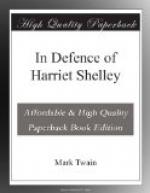“Perhaps” she had never desired that the breach should be irreparable and complete. The truth is, we do not even know that there was any breach at all at this time. We know that the husband and wife went before the altar and took a new oath on the 24th of March to love and cherish each other until death—and this may be regarded as a sort of reconciliation itself, and a wiping out of the old grudges. Then Harriet went away, and the sister-in-law removed herself from her society. That was in April. Shelley wrote his “appeal” in May, but the corresponding went right along afterwards. We have a right to doubt that the subject of it was a “reconciliation,” or that Harriet had any suspicion that she needed to be reconciled and that her husband was trying to persuade her to it—as the biographer has sought to make us believe, with his Coliseum of conjectures built out of a waste-basket of poetry. For we have “evidence” now—not poetry and conjecture. When Shelley had been dining daily in the Skinner Street paradise fifteen days and continuing the love-match which was already a fortnight old twenty-five days earlier, he forgot to write Harriet; forgot it the next day and the next. During four days Harriet got no letter from him. Then her fright and anxiety rose to expression-heat, and she wrote a letter to Shelley’s publisher which seems to reveal to us that Shelley’s letters to her had been the customary affectionate letters of husband to wife, and had carried no appeals for reconciliation and had not needed to:
“Bath(postmark July 7, 1814).
“My
dear sir,—You will greatly oblige
me by giving the
enclosed
to Mr. Shelley. I would not trouble you, but
it is
now
four days since I have heard from him, which to me
is an
age.
Will you write by return of post and tell me what
has
become
of him? as I always fancy something dreadful has
happened
if I do not hear from him. If you tell me that
he is
well
I shall not come to London, but if I do not hear from
you
or
him I shall certainly come, as I cannot endure this
dreadful
state
of suspense. You are his friend and you can feel
for me.
“I
remain yours truly,
“H.
S.”
Even without Peacock’s testimony that “her whole aspect and demeanor were manifest emanations of a pure and truthful nature,” we should hold this to be a truthful letter, a sincere letter, a loving letter; it bears those marks; I think it is also the letter of a person accustomed to receiving letters from her husband frequently, and that they have been of a welcome and satisfactory sort, too, this long time back—ever since the solemn remarriage and reconciliation at the altar most likely.




